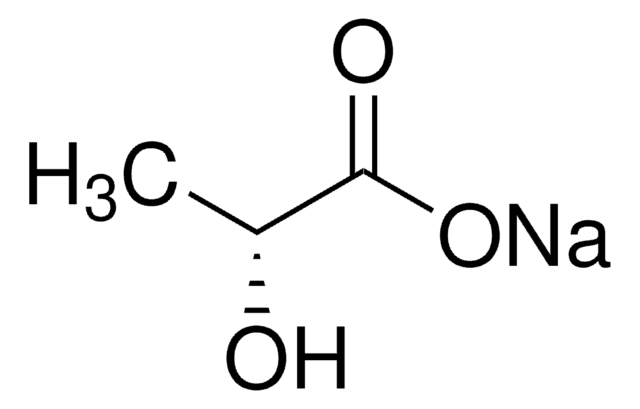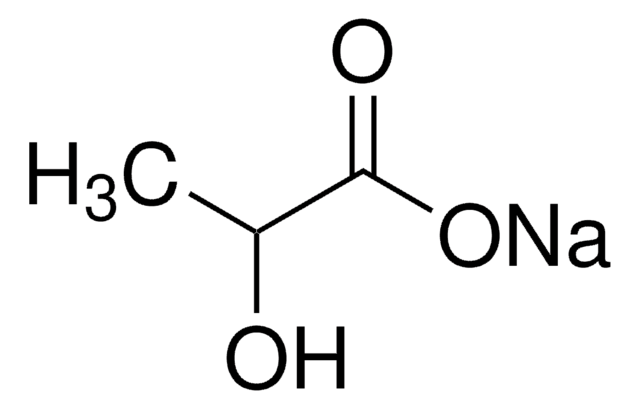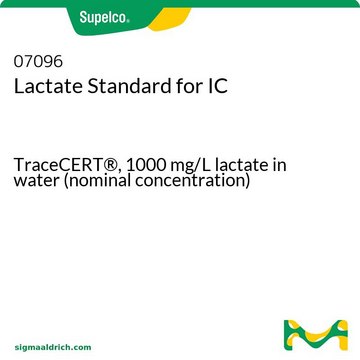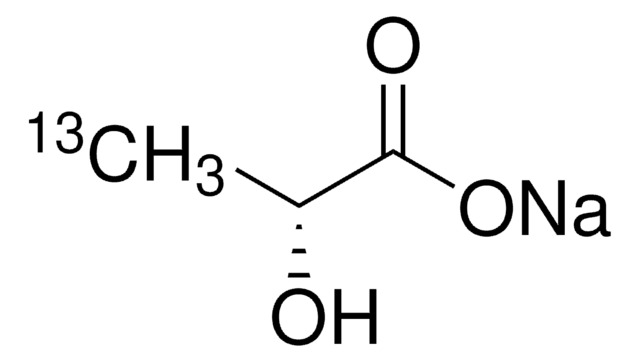71720
Sodium DL-lactate
ReagentPlus®, ≥99.0% (NT)
Synonym(s):
(±)-2-Hydroxypropionic acid sodium salt, DL-Lactic acid sodium salt
Sign Into View Organizational & Contract Pricing
All Photos(1)
About This Item
Linear Formula:
CH3CH(OH)COONa
CAS Number:
Molecular Weight:
112.06
Beilstein:
4332999
EC Number:
MDL number:
UNSPSC Code:
12352100
PubChem Substance ID:
NACRES:
NA.21
Recommended Products
Quality Level
product line
ReagentPlus®
Assay
≥99.0% (NT)
form
powder
functional group
hydroxyl
SMILES string
[Na+].CC(O)C([O-])=O
InChI
1S/C3H6O3.Na/c1-2(4)3(5)6;/h2,4H,1H3,(H,5,6);/q;+1/p-1
InChI key
NGSFWBMYFKHRBD-UHFFFAOYSA-M
Looking for similar products? Visit Product Comparison Guide
Related Categories
Application
Sodium DL-lactate (DL-lactate) has been employed as a carbon source in the minimal salt medium (MSM) for the culture of Pseudomonas putida KT2440. It may be employed as an energy source in the basal complex medium for the growth of Selenomonas ruminantium strains.
Other Notes
Contains approximately equal amounts of D and L isomers.
Legal Information
ReagentPlus is a registered trademark of Merck KGaA, Darmstadt, Germany
Storage Class Code
11 - Combustible Solids
WGK
WGK 1
Flash Point(F)
Not applicable
Flash Point(C)
Not applicable
Personal Protective Equipment
dust mask type N95 (US), Eyeshields, Gloves
Choose from one of the most recent versions:
Already Own This Product?
Find documentation for the products that you have recently purchased in the Document Library.
Customers Also Viewed
Applied microbiology, 30(6), 916-921 (1975-12-01)
A lactate-fermenting strain of Selenomonas ruminantium (HD4) and a lactatenonfermenting strain (GA192) were examined with respect to the stereoisomers of lactate formed during glucose fermentation, the stereoisomers of lactate fermented by HD4, and the characteristics of the lactate dehydrogenases of
Braedon McDonald et al.
Cell host & microbe, 28(5), 660-668 (2020-08-19)
Eradication of pathogens from the bloodstream is critical to prevent disseminated infections and sepsis. Kupffer cells in the liver form an intravascular firewall that captures and clears pathogens from the blood. Here, we show that the catching and killing of
Yujiao Wang et al.
Scientific reports, 4, 6939-6939 (2014-11-07)
As an important method for building blocks synthesis, whole cell biocatalysis is hindered by some shortcomings such as unpredictability of reactions, utilization of opportunistic pathogen, and side reactions. Due to its biological and extensively studied genetic background, Pseudomonas putida KT2440
Andrew J Butler et al.
Transplantation, 97(12), 1272-1278 (2014-03-22)
Over 40% of deceased donors in the UK donate after circulatory death (DCD). Normothermic regional perfusion has been reported to improve outcomes in such donors in Europe and the United States. Unlike the United States, legal and professional requirements in
Influence of lactate and acetate salt adaptation on Salmonella Typhimurium acid and heat resistance.
Wenqian Yuan et al.
Food microbiology, 30(2), 448-452 (2012-03-01)
The aim of the present study was to determine the survival of Salmonella Typhimurium adapted with sodium lactate (NaL), potassium lactate/sodium acetate mixture (KL/NaA) or sodium acetate (NaA) in simulated gastric fluid (SGF) and during heat treatment. NaL-, KL/NaA- and
Our team of scientists has experience in all areas of research including Life Science, Material Science, Chemical Synthesis, Chromatography, Analytical and many others.
Contact Technical Service








